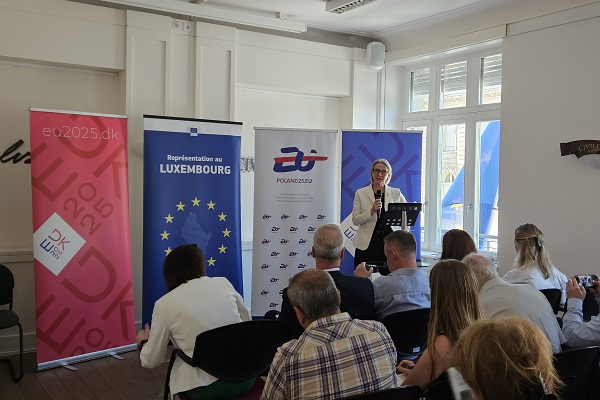 Susanne Shine, Danish Ambassador to Belgium, Luxembourg and the Holy See;
Credit: Jazmin Campbell, Chronicle.lu
Susanne Shine, Danish Ambassador to Belgium, Luxembourg and the Holy See;
Credit: Jazmin Campbell, Chronicle.lu
On Wednesday 2 July 2025, the Representation of the European Commission in Luxembourg hosted a presentation of the priorities of the Danish Presidency of the Council of the European Union (EU), which runs from 1 July to 31 December 2025.
Under the slogan "Strong Europe in a Changing World", the Danish Presidency has set out two main priorities: a secure Europe and a competitive and green Europe.
Anne Calteux, Head of the Representation of the European Commission in Luxembourg, introduced the event, which was held in English at the Foyer Européen in Luxembourg-Gare. She reflected on how uncertainty in recent years has turned into the certainty that Europe can no longer rely on certain longstanding partners and must remain united in response. She praised the Polish Presidency (1 January to 30 June 2025) for prioritising security and welcomed the continuity under the Danish Presidency, which is also focusing on security, along with competitiveness and climate ambitions. She described the Danish programme as "clear, direct and pragmatic", adding that its priorities of a stronger, safer and greener Europe are well aligned with those of the European Commission.
Rafal Hykawy, Chargé d'Affaires a.i. at the Embassy of Poland, presented an overview of the Polish Presidency's main achievements. He described the presidency as a significant logistical undertaking, with Poland having hosted 320 official-level meetings and facilitated 22 informal EU ministerial meetings. It also co-organised three European Council Summits and facilitated 42 Council of the EU meetings in Brussels and Luxembourg. Mr Hykawy emphasised that the Polish Presidency had successfully brought security to the forefront of the EU agenda. Key milestones included agreements on EU-UK and EU-Canada security defence partnerships, progress on energy independence from Russia (notably through the REPowerEU roadmap), a renewed focus on EU enlargement and strengthened support for Ukraine. He also highlighted economic priorities aimed at simplifying EU rules for citizens and businesses to enhance competitiveness, a revised approach to irregular immigration (via a new Common European System for Returns), and the adoption of Council conclusions on protecting the mental health of young people amid growing concerns over the impact of the digital world. He further noted an "important" pharmaceutical package agreed shortly before the end of the Polish term.
Susanne Shine, Danish Ambassador to Belgium, Luxembourg and the Holy See, then presented the priorities of Denmark's eighth Council presidency. She began by congratulating the Polish team on "a job extremely well done" and acknowledged that Denmark was taking over at "a crucial time for the future of Europe". She stressed that the Danish Presidency "will not be business as usual", as it pursues its two main priorities.
On security, the ambassador highlighted the need to ensure Europe is secure and resilient, able to respond to urgent shared challenges and to stand as a geopolitical actor in its own right - ideally capable of defending itself by 2030. She reiterated the need for continued support for Ukraine and pressure on Russia, and called for "new innovative solutions" to address irregular migration. Ambassador Shine also emphasised the importance of defending core values such as the rule of law and media freedom, as well as promoting economic security and reducing broader security risks. She argued that the current geopolitical situation underscored the need for EU enlargement, while maintaining a merit-based approach.
On competitiveness and the green transition, the ambassador stressed the need to reduce administrative burdens on businesses and citizens. The Danish Presidency is aiming for less red tape and better implementation, also promoting positive pre-conditions for competitiveness. Another key priority is the acceleration of the green transition, particularly through investments in renewable energy and better infrastructure. "Climate and the green transition are key to strengthening competitiveness," she stated, referencing both the 2040 climate target (a 90% net emissions reduction from 1990 levels) and COP30, taking place in November 2025.
Moreover, the Danish Presidency plans to host fifteen informal ministerial meetings, along with two major summits in October 2025: an informal ministerial meeting on 1 October and a European Political Community (EPC) meeting on 2 October. Ambassador Shine concluded that the presidency has set out an "ambitious agenda" for this "historically decisive moment" and that the Danish government is "ready to deliver".
During the Q&A session, the Danish ambassador responded to a question from Chronicle.lu about the Capital Markets Union / Savings and Investment Union - a subject of particular interest to Luxembourg as a financial hub. She confirmed Denmark's full support for the Commission's proposal and stressed the urgency of "utilis[ing] this moment to integrate and further develop our capital markets". She said the Danish government would "prioritise negotiations and proposals regarding the savings and investment unions" - both current and upcoming legislative proposals - calling it "crucial to mobilise and attract more private investments". The Danish government is also "open to discuss any initiative that can strengthen the European capital market and European competitiveness". The ambassador added that it was "crucial" to improve the framework conditions for European companies to enhance their ability to attract investment, through both EU legislation and national structural reforms. She also advocated "better use of existing resources to mobilise investment, for example by increasing the use of European investment banks or by expanding the use of guarantee instruments".
Anne Calteux echoed these sentiments, highlighting the need to "mobilise the funds needed to drive the reform agenda forward". She cited estimates of €800 billion per year in additional investment needed to meet EU targets - requiring substantial private contributions alongside public funds.








